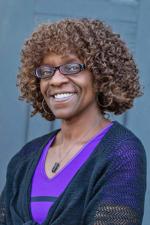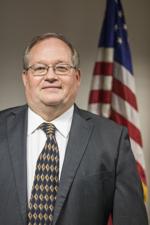A concept called “critical race theory” has become a hotly contested topic of discussion at Manhattan-Ogden school board meetings over the past three months.
Following a decision by school administrators to withdraw the previously approved purchase of voluntary teacher training materials from educational consulting company BetterLesson, board meetings were dominated by public comment periods full of people speaking both for and against critical race theory.
One public comment period on June 30 led to shouting and unruliness, with board president Jurdene Coleman ordering people to leave. Board members, district officials and the chief executive of BetterLesson have explained how the teacher trainings are not related to critical race theory.
This is a part of a national discourse on the topic, which is mostly a partisan issue.
Six states with both a Republican-controlled legislature and GOP governor (Idaho, Iowa, New Hampshire, Oklahoma, Tennessee and Texas) have passed laws meant to ban the topic from being taught in schools.
The Mercury asked board members and candidates in the upcoming USD 383 board election to define critical race theory and what the concept means to them. A few people said they support using the theorem as a teaching tool, while others say they do not like the concepts included within the theory.
Here are their responses.
◊◊◊◊

Hagemeister
One can spend a short time on the internet to find an accurate definition of critical race theory. They can also find ample current articles both in support of and critical of CRT.
My focus remains on the work being done by the board and members of the USD 383 team to support the objectives and strategies outlined in our strategic framework.
If we believe that all students are capable of great things and deserve the same opportunities, then we have to be willing to examine our policies and practices and then take action steps to make the changes needed to help every student be successful.
— Karla Hagemeister, board member and candidate
◊◊◊◊

Mattingly-Ebert
The reason, I believe, that issues surrounding CRT are so heated is because the assertions of CRT demand that people accept reasoning that is too simplistic when it comes to history, socioeconomic issues and family dynamics.
Additionally, CRT-proponents frequently claim that anyone who challenges their claims is a racist or fragile, so it’s an ideology that shuts down any conversation or dissent. For these reasons, it’s especially ineffective in educational settings.
I cannot and will not support programs without evidence and indicators of student success; or any agenda that is divisive or can become divisive to our children.
— Betty Mattingly-Ebert, board candidate
◊◊◊◊

Parks
Critical race theory is a tool that when used properly can enhance classroom relations and create an atmosphere that encourages understanding. To be honest, I think that any time race enters a conversation it makes a lot of people uncomfortable, but it’s something that we need to be able to have more conversations about and not less.
Anything that will help teachers better connect with their students is a good thing. People are angry, scared and feeling defensive when they don’t need to be. Information is available, but people have to want to be informed and not just opinionated.
— Teresa Parks, board candidate
◊◊◊◊

Harms
I would believe that CRT is how race affects our decisions in everyday life, policies, laws, etc. Sometimes subliminal and sometimes blatant.
The theory has been around for a few decades and has some relevance but may be too extreme to be taught to our youth in our community.
Teaching diversity in a positive way should be the goal of our district. Everyone should feel welcome and have the opportunity to learn and grow everyday in our schools.
— Kevin Harms, board candidate
◊◊◊◊

Morris- Hardeman
Critical race theory is using critical thinking skills to examine the root cause of racial inequities in our country and how to address them. I do support this framework.
It has become much more apparent in the past few years how much systemic racism exists, and I believe we all have an obligation to examine our beliefs and do our part to eliminate racism.
I think there is a lot of misinformation about what CRT is, and I think that was being perpetuated by a group of people in Manhattan that was causing others to become upset by the concept without really understanding it.
— Jayme Morris-Hardeman, board candidate
◊◊◊◊

Treece
I’m not in favor of the CRT stuff because it was a Marxist idea put forth, and it’s also theory, not fact. I’m a science person and I deal in facts a lot; I’m not interested in just theories, most especially if it’s a Marxist thing and it tends to take our educational process toward Marxist viewpoints.
I don’t see burdening teachers with another thing that is only a theory anyway; there’s room for improvement in education, and I’m thoroughly for that.
— Carl Treece, board candidate
◊◊◊◊

Chua
Critical race theory is a law-based theory developed by Derrick Bell and legal colleagues in the 1970s and 1980s initially to show disparities within the judicial system.
Within the practice of CRT, it is believed that racism is a daily occurrence for most people of color, but not something white people are willing to admit to happening and therefore work to eliminate.
CRT helps explain the effects that historical racism has in modern society while examining how systems remain in place to prolong inequality for traditionally marginalized groups.
— Jen Chua, board candidate
◊◊◊◊

Ruzzin
Broadly speaking, I find flaws in CRT because it is a collectivist ideology predicated on making people’s sense of identity based on the different groups they can be related to rather than as individuals. And further, that people are treated according to those collectivist identities.
On its surface, CRT seems to be about fairness and justice. But I think there are more flaws in CRT than there are benefits. There may well be things in our nation that we need to improve, but this is not the way to do that. And even if it were, the school board is not the forum that should be used to do so.”
— Steven Ruzzin, board candidate
◊◊◊◊

Weixelman
According to (Delgado and Stefanic) as summarized in the UCLA Luskin School of Affairs: “CRT recognizes that racism is engrained in the fabric and system of the American society. The individual racist need not exist to note that institutional racism is pervasive in the dominant culture.”
Simply reading through the Better Lesson materials clearly shows that what’s being taught is based on CRT. Therefore, I do not support the board’s attempt to train teachers or students with it. There are other, much better ways to help students become more socially and culturally aware than pushing CRT in their education.
— Christine Weixelman, board candidate
◊◊◊◊

Edie
Critical race theory examines social, cultural and legal issues as they relate to race and racism.
So, to me it becomes a way of turning back the clock from the work that has been done since the ‘60s and ‘70s.
Yes, we still have a long way to go, but let us move forward and learn from the past, not backward into the past. We need to move forward with the anti-bullying and Multi Tier System of Support that we have spent so much time, effort and money on to encourage and support one another, not beat each other up.
— Darell Edie, board member
◊◊◊◊

Herrman
This has been a contentious issue, and it saddens me to see the divide in the community. I believe that everyone on each side of this issue wants the same thing — what is best for all kids.
Both sides agree there is a need for diversity education for our staff and to provide our teachers another arrow in their quiver to help all students.
USD 383 will seek out opportunities for professional learning around this topic and we will be sure that it has proven the desired outcomes.
(Herrman previously told The Mercury he doesn’t support using CRT as a teaching tool).
— Curt Herrman, board member
◊◊◊◊

Brighton
Honestly, the current zeitgeist surrounding critical race theory is distracting everyone from issues our board wants to be working on.
We are not mandating all teachers take one specific diversity, equity and inclusion training. We are not adopting a new curriculum. However, our predominantly white teaching staff have requested tools to help them better teach our students of color.
It’s our obligation to get beyond the rhetoric and get to work ensuring we’re providing all students with the best possible education.
— Kristin Brighton, board member
◊◊◊◊

Santos
I believe that critical race theory has no place in our school district. I could keep going but as a matter of fact, USD 383 is committed to diversity and ensuring that every student in our district has the equal opportunity to succeed.
I support this mission and all that it entails, and at no time has critical race theory been a subject matter of any official discussion that I have been involved in.
— Brandy Santos, board member
◊◊◊◊

Coleman
Critical race theory was created by scholars in critical legal studies and radical feminism who wanted to have a way to describe the stagnation in policy change that followed the civil rights movement.
CRT asserts that racism is an ordinary feature of society imbedded in systems and institutions, like the legal system, public education, and health care, that replicate inequality (not about individual behaviors).
I am deeply saddened by the attempts of local community leaders to pull the focus away from professional development in Culturally Responsive Teaching and Learning and anchor their arguments in conspiracy theories.
I can say without a shred of doubt that critical race theory is not being taught to our students and is not part of mandated training for our staff.
— Jurdene Coleman, board president and outgoing member
◊◊◊◊

Lewison
Critical race theory is a collegiate-level academic theory that we are not teaching in USD 383. Unfortunately, the recent outrage over this theory is something that was drummed up to be a wedge issue that further divides people.
One thing that has become clear to me as a result of this local kerfuffle is that USD 383 is actually on the right track.
Part of 383’s well defined strategic plan that we created includes a core belief statement that “we will create a climate that values diverse thinking, mutual respect and working as a team for the betterment of the whole organization.”
— Katrina Lewison, outgoing board member
"board" - Google News
July 11, 2021 at 01:00AM
https://ift.tt/3yNrlKq
USD 383 board members, candidates offer thoughts on critical race theory - Manhattan Mercury
"board" - Google News
https://ift.tt/2KWL1EQ
https://ift.tt/2YrjQdq
Bagikan Berita Ini














0 Response to "USD 383 board members, candidates offer thoughts on critical race theory - Manhattan Mercury"
Post a Comment